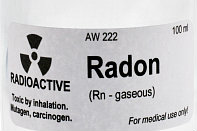
What is radon? If you have never heard of radon, you’re not alone. Radon is an odorless, tasteless and invisible gas produced by the naturally occurring decay of uranium in soil, rocks, and water. Radon escapes easily from the ground into the air and then disintegrates through short-lived decay products called radon progeny. As the radon progeny decay they emit alpha particles which attach themselves to aerosols, dust and other particles that we breathe.
If these particles are inside our home, we will be breathing them. When we breathe them they get deposited onto cells lining the walls of our lungs, where they can damage DNA and potentially cause lung cancer. Lung cancer is the only known effect on human health from exposure to radon in the air.
Yes, radon can cause lung cancer. It can be a real shock when a non-smoker receives a lung cancer diagnosis, and in many cases it is related to high levels of radon in their home. In fact exposure to radon is the second leading cause of lung cancer after smoking. According to the US Environmental Protection Agency (EPA), there are about 20,000 lung cancer deaths annually in the US which are due to radon.
For most people, the greatest exposure to radon comes from the time that they spend inside their home. The concentration level of radon can be very different from home to home, even homes next door to each other can vary greatly. One home may have very high levels of radon and the next door neighbor’s home may have no measureable levels.
Here’s the good news about radon. It’s important to learn about radon, especially what it is and how it can affect you. Armed with this information then you’ll know how important it is to test to see what levels of radon may be in your home and what steps to take if the levels are higher than recommended. You can remediate or reduce radon to levels that are acceptable, but only if you know if there is a problem and take action.
What’s the level of radon in your home? This is a number that every homeowner should know. We’ll be covering ways to test for radon soon. Join in and test your home, don’t you want to live with healthier indoor air?


